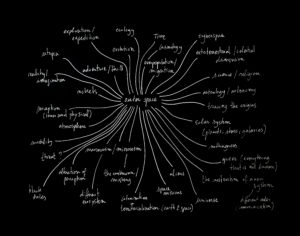Anton Vidokle. Immortality for All!
— A film trilogy on Russian Cosmism
Sunday 17 November 2019, 4:30 pm

In this three-part film project, artist Anton Vidokle probes Cosmism’s influence on the twentieth century and suggests its relevance to the present day.
The cultural movement known as ‘Russian Cosmism’ was developed by philosopher Nikolai Fedorov at the end of the 19th Century and emerged in Russia before the October Revolution. Entailing a broad theory of natural philosophy, it had the utopian objective to not only reform art but also create a brand new world: its ideological pillars were the end of Death, resurrection, and free movement within cosmic space. In his ninety-six minute film trilogy, Anton Vidokle, artist and e-flux journal editor, investigates the foundations of Cosmist thinking and traces the remains of Soviet art and architecture, from the desolate steppes of Kazakhstan to museums in Moscow. Compositions by John Cale and Éliane Radigue constitute the musical background for an imaginary that seems suspended in time.
This is Cosmos, 2014 (28’10 min)
HD Video, color, sound
Russian with English subtitles
Shot in Siberia and Kazakhstan, as well as Moscow and Archangelsk regions, the first film in the trilogy on Russian Cosmism comprises a collage of ideas from the movement’s diverse protagonists, including founding philosopher Nikolai Fedorov. Fedorov, among others, believed that death was a mistake—a flaw in the overall design of the human, “because the energy of cosmos is indestructible, because true religion is a cult of ancestors, because true social equality is immortality for all.” For the Russian cosmists, the definition of cosmos was not limited to outer space: rather, they set out to create “cosmos,” or harmonious and eternal life, on Earth. The ultimate goal, as illuminated in the short film, was “to construct a new reality, free of hunger, disease, violence, death, need, inequality—like communism.”
The Communist Revolution Was Caused By The Sun, 2015 (33’36 min)
HD Video, color, sound
Russian with English subtitles
The second part of the trilogy looks at the poetic dimension of solar cosmology of Soviet biophysicist, Alexander Chizhevsky. Shot in Kazakhstan, where Chizhevsky was imprisoned and later exiled, the film introduces Сhizhevsky’s research into the impact of solar emissions on human sociology, psychology, politics and economics in the form of wars, revolutions, epidemics and other upheavals. The film aligns the life of post-soviet rural residents and the futurological projects of Russian cosmism to emphasize that the goal of the early Soviet breakthroughs aimed at the conquest of outer space was not so much technical acceleration, but the common cause of humankind in their struggle against limitations of earthly life.
Immortality and Resurrection for All!, 2017 (34’17 min)
HD Video, color, sound
Russian with English subtitles
The trilogy’s last part is a meditation on a museum as the site of resurrection — a central idea for many Cosmist thinkers, scientists and avant-garde artists. Filmed at the State Tretyakov Gallery, Moscow Zoological Museum, the Lenin Library and the Museum of Revolution, the film looks at museological and archival techniques of collection, restoration and conservation as a means of the material restoration of life, following an essay penned by Nikolai Fedorov on this subject in 1880s. The film follows a cast comprised of present-day followers of Fedorov, several actors, artists and a Pharaoh Hound that playfully enact the resurrection of a mummy, a close examination of Malevich’ Black Square, Rodchenko’s spatial constructions, taxidermied animals, artifacts of the Russian Revolution, skeletons, and mannequins in tableau vivant-like scenes, in order to create a contemporary visualization for the poetry implicit in Fedorov’s writings.
Activity in collaboration with La Capella, within the frame of BCN Producció, inside the curatorial project “Esdevenir immortal i després morir” by Caterina Almirall, which will be exhibited between October 2020 and January 2021.
http://lacapella.barcelona/ca/esdevenir-immortal-i-despres-morir
http://lacapella.barcelona/en/immortality-all-film-trilogy-russian-cosmism


